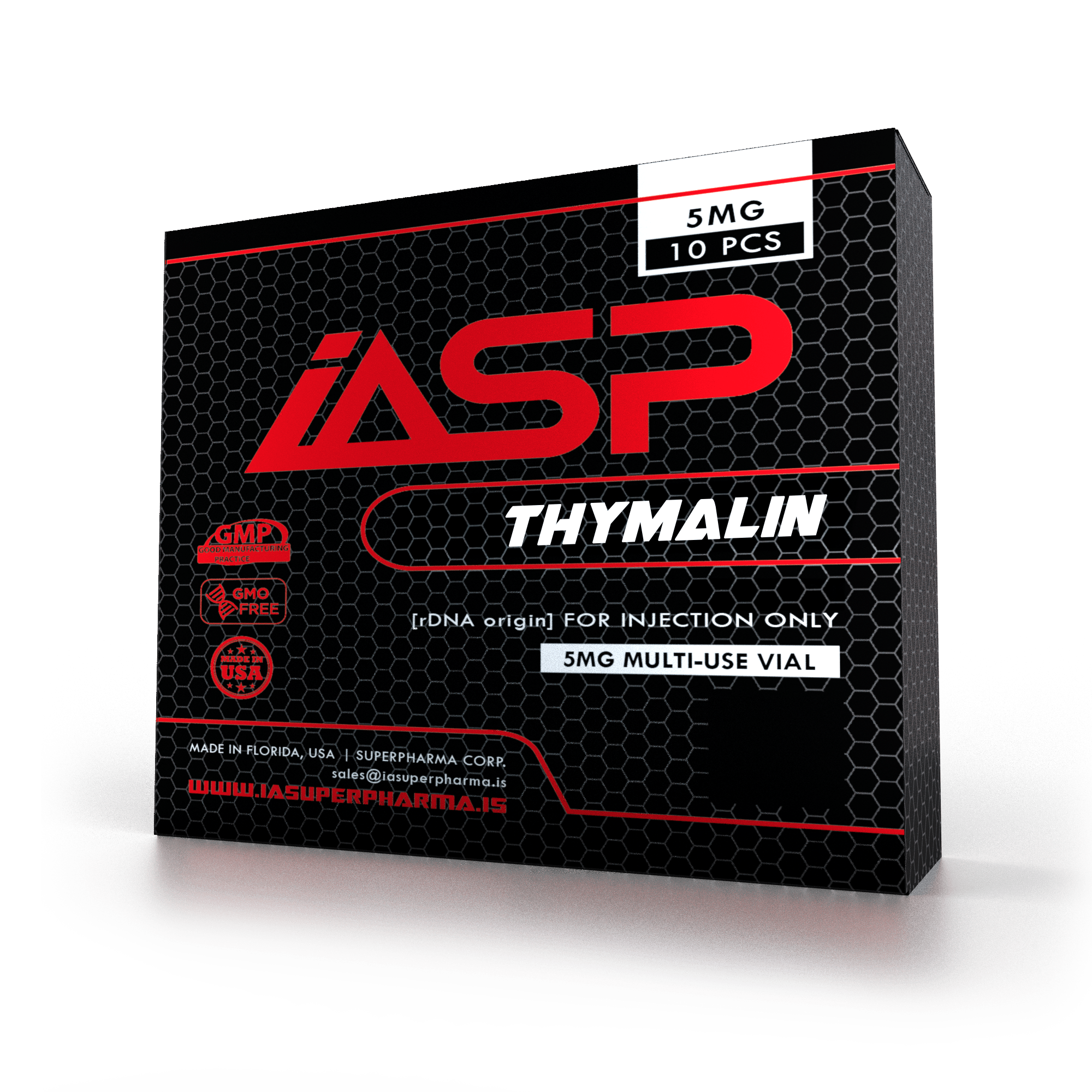This product is a box of 10 vials.
What Is Thymalin?
Thymalin is a man-made version of thymulin, a substance found in the thymus gland since 1977. It helps control inflammation and pain, protects the brain, and supports the immune system. Studies suggest thymalin may improve immune function, fight heart disease, regulate sleep patterns, and even extend lifespan in animal studies.
Sequence: Pyr-Ala-Lys-Ser-Gln-Gly-Gly-Ser-Asn
Molecular Formula: C33H54N12O15
Molecular Weight: 858.864 g/mol
PubChem CID: 3085284
CAS Number: 63958-90-7
Synonyms: Thymulin, Thymic Factor, Nonathymuli, Facteur Thymique Serique, Serum Thymic Factor
Thymalin and Immune System Health
Research shows thymalin significantly affects the immune system, particularly by enhancing cellular immunity. It adjusts levels of lymphocytes (a type of white blood cell), supports T-cell development, and boosts natural killer (NK) cell activity. This is crucial for conditions like diabetes, where immune imbalances can increase the risk of infections or cancer. In patients with diabetic retinopathy, thymalin increases T-cell numbers, reducing inflammation and slowing disease progression. It may also help restore immune function in HIV patients when combined with standard treatments, potentially increasing CD4+ T-cell counts. Thymalin is being studied as a vaccine booster, as it may enhance immune responses, allowing vaccines to work better with smaller doses or less harmful pathogens, making them safer and more effective. In rats with removed thyroid glands, thymalin prevents declines in immune function, reducing infection risk and improving overall health.
Thymalin and Cancer
In mouse studies, thymalin enhances the effects of pulsed laser therapy used to treat skin cancers, like melanoma, by increasing antibody-producing cells in the spleen. This may improve tumor suppression and increase remission rates. Even without laser therapy, thymalin slows tumor growth in nearly 80% of cases and causes tumor regression in over half. In chronic lympholeukemia, combining thymalin with plasmapheresis improves blood health and speeds up recovery compared to standard chemotherapy.
Thymalin and Psoriasis
Psoriasis is an inflammatory condition affecting the skin and joints. When thymalin is added to standard psoriasis treatments, it improves lab results and patients’ clinical conditions, showing a clear impact on reducing disease activity.
Thymalin and Tuberculosis
In patients with severe tuberculosis, adding thymalin to antibiotic treatment significantly increases cure rates, with tailored therapy achieving nearly 95% success. Thymalin is especially effective early in the infection, helping the immune system fight drug-resistant bacteria. It boosts T-cell function, which is often weakened in tuberculosis, particularly when combined with conditions like diabetes.
Thymalin and Kidney Disease
For patients with chronic glomerulonephritis, an inflammatory kidney condition, thymalin improves kidney function, reduces inflammation, and enhances immune health. This may slow disease progression, delay the need for dialysis or transplants, and improve overall outcomes.
Thymalin and Sleep-Wake Cycles
Changes in sleep-wake cycles, like those during winter or aging, can weaken the immune system, increasing infection risk. Thymalin corrects immune deficiencies linked to these changes, potentially preventing infections more effectively than some vaccines, like the flu vaccine.
Thymalin and Heart Disease
Thymalin may prevent and reverse heart disease by lowering lipid levels and improving lymphocyte function to clear artery plaque. It corrects immune dysfunction that contributes to atherosclerosis, helping the body combat heart disease more effectively.
Thymalin and Surgery Complications
Thymalin may reduce infection and inflammation risks after surgery, a major cause of complications, especially in orthopedic procedures. This could allow safer surgeries for high-risk patients and lower adverse outcomes.
Thymalin and Gum Disease
Periodontitis, an inflammatory gum condition, can lead to tooth loss. Thymalin reduces inflammation and boosts immune responses to fight the bacteria causing the disease, aiding in treatment where prevention fails.
Thymalin and Anorexia
Anorexia nervosa often disrupts thyroid hormone levels, weakening immunity and causing thymic atrophy. Thymalin, combined with zinc supplementation, may reverse these immune changes and support recovery.
Thymalin and Immune Regulation
Thymalin’s main benefit is enhancing T-cell function, which helps fight infections, slow cancer growth, reduce heart disease, and lower inflammation. Some clinical uses are already standard, and ongoing research suggests thymalin could improve vaccine and antibiotic effectiveness, critical in the fight against drug-resistant bacteria.
Curious about Thymalin?
Join our Facebook group to engage directly with thousands of others who use this product, and follow our Facebook/IG pages for hot updates and product announcements!


